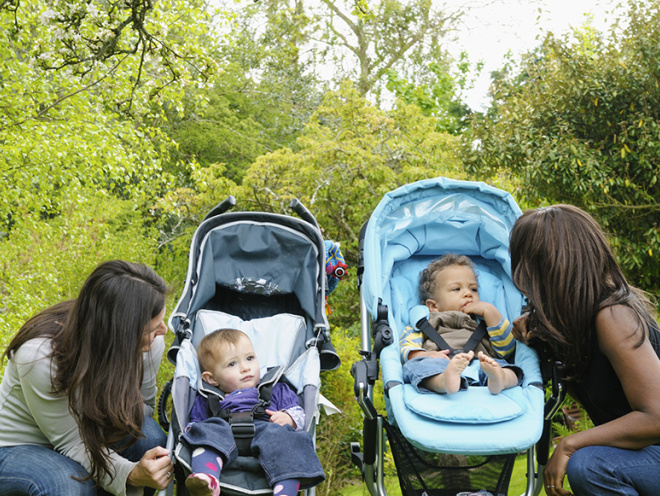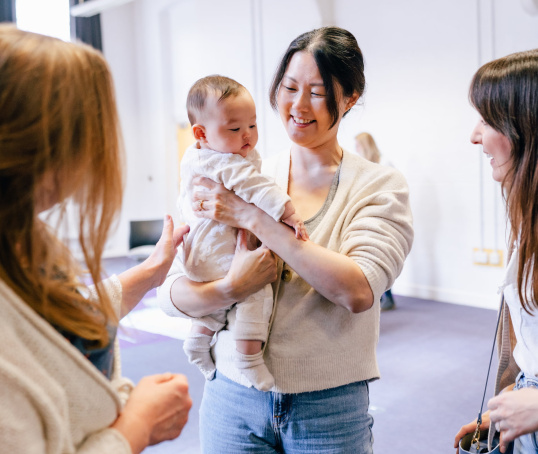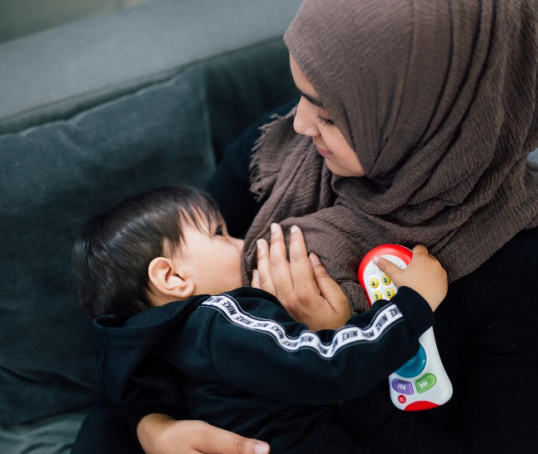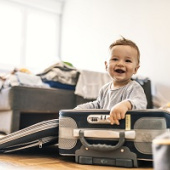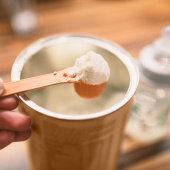Before, you probably just had to grab your phone, wallet and keys before you left the house. Now your baby needs stuff too. Here’s a guide on what to take.
You’ve carefully chosen your changing bag and you’re about to pack it for the first time. But what do you need to pack? Here’s the lowdown…
What do you need for nappy changing?
Young babies need their nappy changed up to 10 or 12 times a day. Older babies need changing at least six to eight times daily (NHS, 2018). This all means you'll need stuff for nappy changing while you're out and about.
- A changing mat, cotton wool or alcohol-free and fragrance-free wipes.
- A plastic bag or nappy sacks for dirty nappies, as most places ask you to take your nappy home with you. On the other hand, commercial premises with nappy changing facilities should dispose of nappies.
- Barrier cream (if you’re using it) to protect your baby's skin. You could apply a small amount to the nappy area if needed to help soothe nappy rash.
- Three to four clean disposable nappies, or liners and covers if you're using cloth nappies. How many you need depends on how long you'll be out for and how old your baby is.
- A change of clothes for your baby in case of any nappy explosions that leak. An extra plastic bag or nappy sack to put wet and dirty clothes in won’t go amiss either.
(The Environmental Protection Act, 1990; NHS, 2018; RCM, 2018)
What do you need for feeding your baby?
If you’re breastfeeding
- Clean breast pads, especially if you leak often.
- Breastfeeding shawl or muslin cloth, if it helps you feel more comfortable and relaxed. They can also be useful for mopping up if your baby burps up milk and/or is sick.
If you are using formula milk
If you plan to make up formula when you're out:
- Two sterilised bottles or more if you are out for longer than a few hours.
- Formula powder measured out in a clean plastic container plus a flask of hot water that's just been boiled. You can also get freshly boiled water when you're out from a cafe, for example.
If you make up the bottle at home, remember that it should be used within:
- 24 hours if stored in a fridge
- four hours in a cool bag with an ice pack
- two hours at room temperature.
(NHS, 2017)
You could also take ready-mixed formula cartons with sterilised bottles that are really handy on the go.
If you are using expressed breast milk
- Two sterilised bottles of expressed breast milk or more if you are out for longer than a few hours.
- A cool bag with an ice pack for storage.
(NHS, 2018)
You can store expressed breast milk that’s been cooled in the fridge in a cool bag for up to 24 hours. Then, if your baby doesn’t mind it being cold, you can give it to them straightaway (NHS, 2016). If your baby prefers warm milk, put the bottle in warm water or hold it under warm running water.
You shouldn’t keep a bottle of breastmilk for more than one hour if your baby has drunk from it. So even though it might be frustrating after all the effort you’ve put into expressing it, you’ll need to throw any remaining milk away (NHS, 2018).
If your baby is eating solid foods
You’ll need to bring food, a spoon and a bib. When your baby gets older and you go out for longer, you’ll need to think ahead to meal times and pack something for them to eat.
Pack a pot or two of purée you’d give your baby at home in a cool bag, as well as some finger foods like carrot sticks if your baby is having them. If your baby is a year or more and eating similar foods to you, you could try bringing your toddler something to eat (WHO, 2011).
What you need for you
Just because you’re looking after your baby, it doesn’t mean you can’t take some things for yourself. Besides the essential - keys, wallet and phone - there’s no need to feel guilty about taking a magazine to read with a coffee while your baby is napping.
Particularly if you’re breastfeeding, it’s a good idea to bring a snack as you might get more hungry than usual. Why not try taking something healthy like nuts, hummus and pitta bread, or carrot sticks, or buying some healthy snacks on the go (BNF, 2018).
Entertainment
Easily portable toys and books are handy. Those attachable buggy books and toys can be especially great because they don’t fall off. Playing and interacting with your baby will help their brain to develop, so it’s a good idea to always have a couple of toys to hand on the go.
Toys are also a useful distraction if you need to keep your baby entertained while on the move. Remember to swap toys in your bag frequently, as you don’t want you (both) being bored from the offset with them when you’ve got a long journey to contend with.
This page was last reviewed in November 2018.
Further information
Our support line offers practical and emotional support with feeding your baby and general enquiries for parents, members and volunteers: 0300 330 0700. We also offer antenatal courses which are a great way to find out more about birth, labour and life with a new baby.
You might find attending one of our NCT New Baby courses helpful as they give you the opportunity to explore different approaches to important parenting issues with a qualified group leader and other new parents in your area.
Make friends with other parents-to-be and new parents in your local area for support and friendship by seeing what NCT activities are happening nearby.
British Nutrition Foundation. (2018) FAQs Pregnancy and breastfeeding, Healthy eating while you are feeding your baby. Available at: https://www.nutrition.org.uk/attachments/article/1160/BNF%20Nutrition%20FAQs%20Pregnancy%20and%20Breastfeeding_breastfeeding%20concerns.pdf [Accessed 10th November 2018].
Department of Health and Social Care. (2013) Advice on preparation of formula milks restated. Available at: https://www.gov.uk/government/publications/advice-on-preparation-of-for… [Accessed 10th November 2018].
Entwistle FM. (2013) The evidence and rationale for the UNICEF UK Baby Friendly Initiative standards. UNICEF UK. Available at: https://www.unicef.org.uk/babyfriendly/about/evidence-and-rationale-for… [Accessed 20th November 2018].
NHS. (2016) Expressing and storing breast milk. Available at https://www.nhs.uk/conditions/pregnancy-and-baby/expressing-storing-breast-milk/ [Accessed 10th November 2018].
NHS Choices (2016b) Sterilising baby bottles. Available from: https://www.nhs.uk/Conditions/pregnancy-and-baby/Pages/sterilising-bottles.aspx [Accessed 21st November 2017]
NHS. (2018) How to change your baby’s nappy. Available at: https://www.nhs.uk/conditions/pregnancy-and-baby/nappies [Accessed 20th November 2018].
Scanlan R. (2018) What parents and professionals need to know about newborn skincare. Available at: https://www.rcm.org.uk/newborn-skincare [Accessed 20th November 2018].
WHO. (2011) What is the recommended food for children in their very early years? Available at: http://www.who.int/features/qa/57/en/ [Accessed 20th November 2018].
